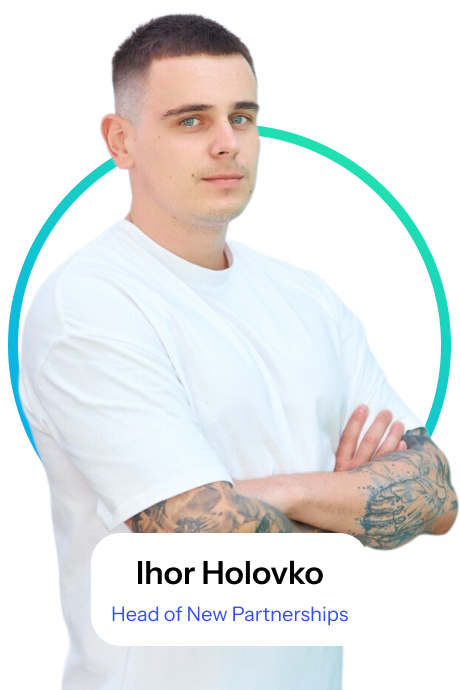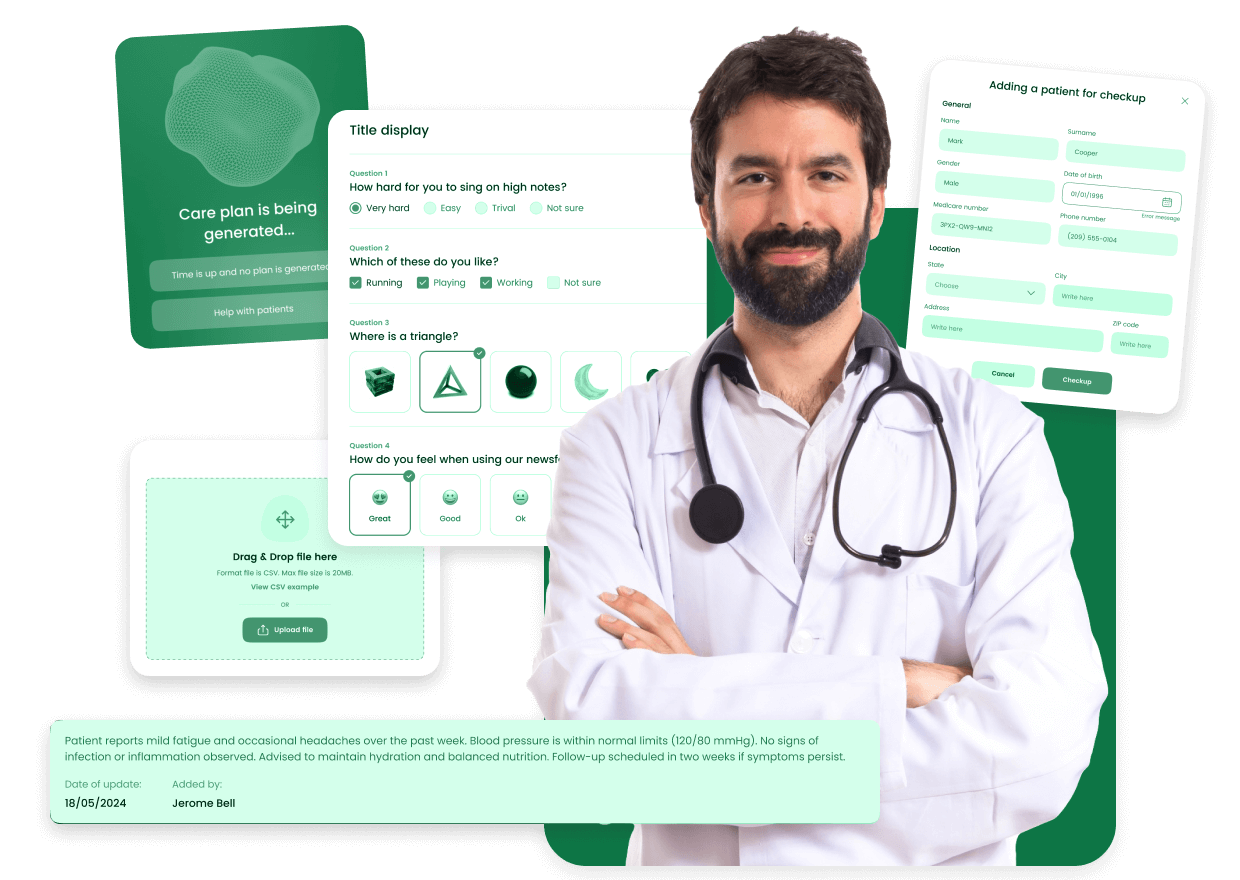
Advanced Dementia Care Platform for Improved Patient Outcomes and Caregiver Support
AI
Healthcare
IoT
Engineering
7 million
Americans are living with Alzheimer’s dementia in 2025
83%
Caregivers report high emotional stress due to lack of support tools
$321 million
Annual U.S. healthcare spending on dementia care in 2025
About client
The client is a U.S.-based at-home healthcare services medical practice dedicated to improving chronic condition management, with a strong focus on dementia care. Their mission is to empower healthcare providers and caregivers with innovative tools that enhance care quality, reduce operational inefficiencies, and support patients outside traditional clinical settings. Their existing platform serves as a foundation for managing chronic care, primary care, and behavioral health.
What was the client's initial goal?
The client approached Riseapps to develop an advanced dementia care module as part of their platform upgrade. They aimed to:
- Improve care coordination for dementia patients and caregivers.
- Address technical limitations of their current monolithic architecture.
- Integrate AI features to improve efficiency while staying HIPAA compliant.
What was the client's initial goal?
The client approached Riseapps to develop an advanced dementia care module as part of their platform upgrade. They aimed to:
- Improve care coordination for dementia patients and caregivers.
- Address technical limitations of their current monolithic architecture.
- Integrate AI features to improve efficiency while staying HIPAA compliant.
6 healthcare tech experts
The core project's team included six seasoned tech experts in healthcare.
4 hours vs 30 mins
We reduced the time to generate treatment plans for dementia patients.
$200 billion
Could be saved annually savings in the US with coordinated tech solutions
85%
Target AI accuracy for care plan recommendations post-launch.
The problems
1
Inefficient Medical Documentation
Medical personnel spend excessive time manually documenting patient interactions across phone calls, telemedicine, and in-person visits, reducing time for direct care.
2
Limited Personalization in Care Plans
Traditional tools offer generic care recommendations, failing to account for individual patient needs or real-time changes, especially critical in dementia management.
3
Low Trust and Accuracy in AI Tools
Healthcare providers and caregivers distrust AI due to risks of inaccuracies or hallucinations, requiring robust validation.
4
Lack of Scalable, User-Friendly Infrastructure
The monolithic architecture of the current platform struggles with scalability, performance, and user experience, impeding efficient care delivery.
Same problems? Get answers from our CTO
The solutions
Personalized AI-Driven Care Plans
Traditional care management provided generic recommendations, failing to consider specific individual circumstances and real-time patient needs.
Implemented advanced AI algorithms based on Large Language Models (LLMs) with Retrieval-Augmented Generation (RAG), capable of dynamically generating personalized care recommendations aligned with each patient’s medical history, symptoms, and caregiver input.
Impact:
- Increases accuracy and relevance of care plans by 20-30% (projected).
- Enhances patient and caregiver satisfaction through tailored interventions.
- Improves clinical outcomes with precise, adaptive care strategies.
Implemented advanced AI algorithms based on Large Language Models (LLMs) with Retrieval-Augmented Generation (RAG), capable of dynamically generating personalized care recommendations aligned with each patient’s medical history, symptoms, and caregiver input.
Impact:
- Increases accuracy and relevance of care plans by 20-30% (projected).
- Enhances patient and caregiver satisfaction through tailored interventions.
- Improves clinical outcomes with precise, adaptive care strategies.

Real-Time AI Ambient Scribe & Therapy Notes
Manual documentation across multiple interaction types consumes valuable time, reducing focus on patient care.
Integrated real-time voice transcription using tools like Deepgram to automatically generate medical notes from phone calls, telemedicine sessions, and in-person visits, with human-in-the-loop validation for accuracy.
Impact:
- Reduces documentation time by up to 50%.
- Allows medical staff to prioritize patient interaction over administrative tasks.
- Ensures comprehensive, up-to-date records for dementia care coordination.
Integrated real-time voice transcription using tools like Deepgram to automatically generate medical notes from phone calls, telemedicine sessions, and in-person visits, with human-in-the-loop validation for accuracy.
Impact:
- Reduces documentation time by up to 50%.
- Allows medical staff to prioritize patient interaction over administrative tasks.
- Ensures comprehensive, up-to-date records for dementia care coordination.
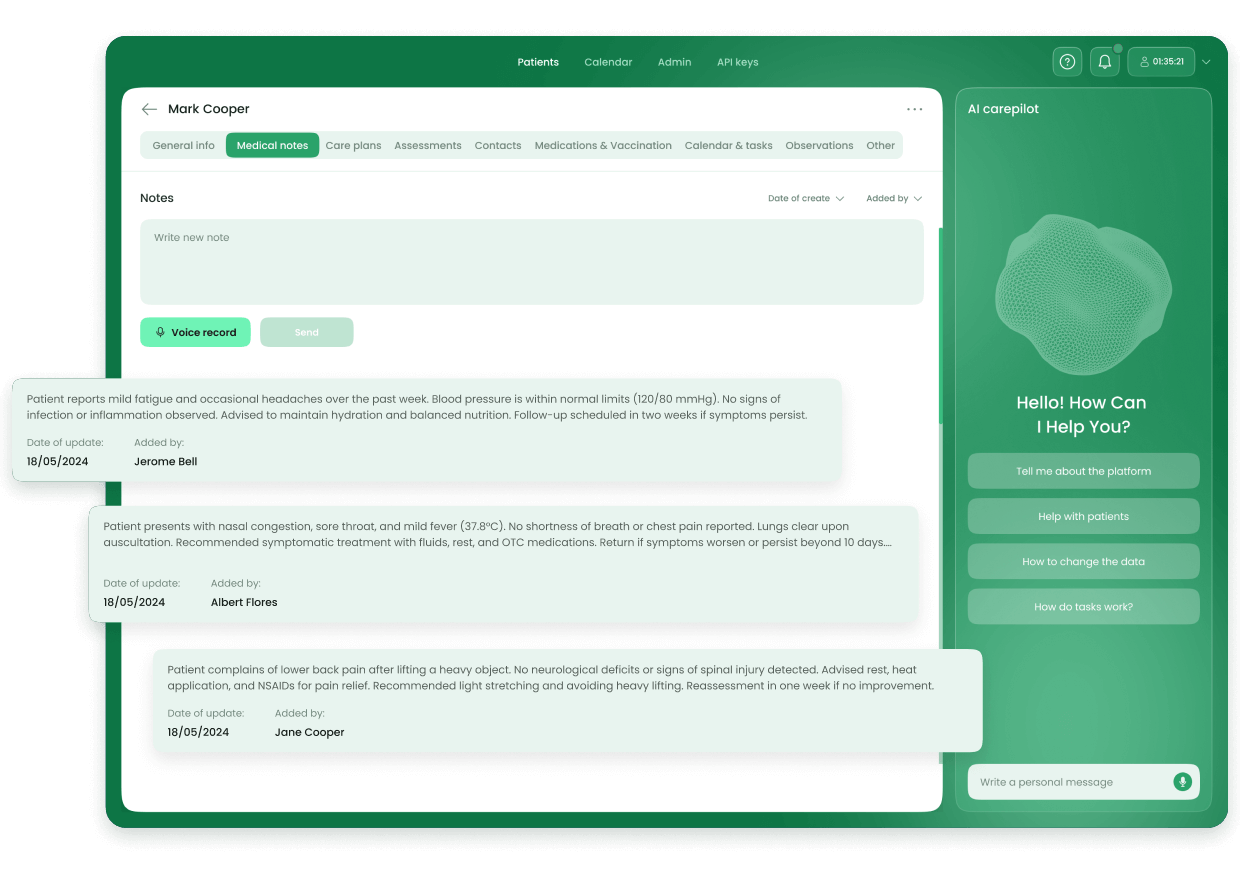
Cost-Effective Self-Hosted Integrations
High costs of third-party telemedicine and eSignature providers limit scalability and affordability.
Deployed self-hosted LiveKit servers for telemedicine and OpenSign for eSignatures, reducing expenses to server ownership while maintaining functionality.
Impact:
- Cuts operational costs by 40-60% compared to subscription-based services.
- Enables scalable deployment for growing patient bases.
- Maintains HIPAA compliance with secure, controlled infrastructure.
Deployed self-hosted LiveKit servers for telemedicine and OpenSign for eSignatures, reducing expenses to server ownership while maintaining functionality.
Impact:
- Cuts operational costs by 40-60% compared to subscription-based services.
- Enables scalable deployment for growing patient bases.
- Maintains HIPAA compliance with secure, controlled infrastructure.
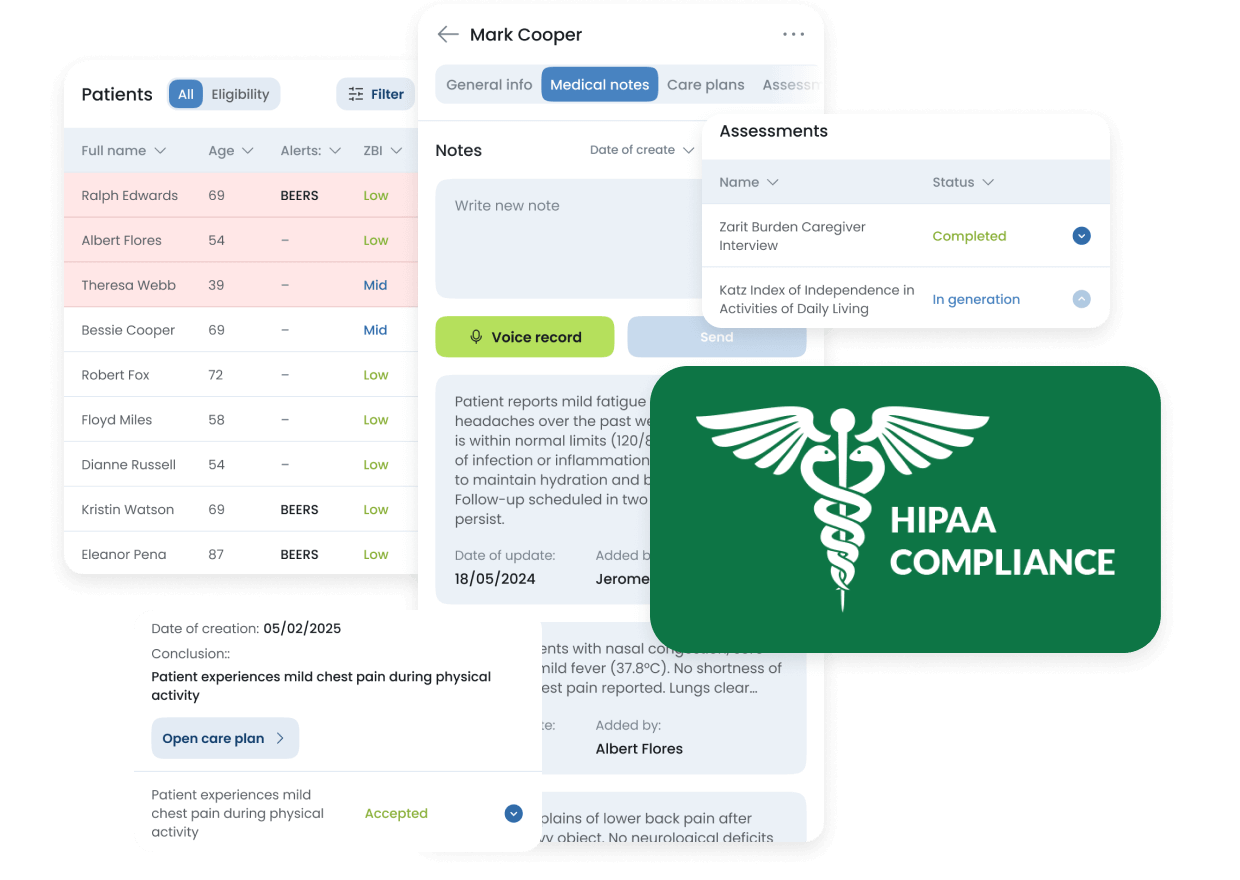
Task and Goal Management Dashboard
Caregivers lack a centralized, intuitive tool to track tasks and goals, leading to inefficiencies and missed care opportunities.
Developed a dashboard integrating short-term tasks (e.g., medication reminders) and long-term goals (e.g., mobility improvement) into care plans, visible to caregivers and patients via a rich chat interface.
Impact:
- Boosts caregiver efficiency by 35% through streamlined workflows.
- Enhances patient engagement with clear, actionable care steps.
- Reduces oversight errors in complex dementia care scenarios.
Developed a dashboard integrating short-term tasks (e.g., medication reminders) and long-term goals (e.g., mobility improvement) into care plans, visible to caregivers and patients via a rich chat interface.
Impact:
- Boosts caregiver efficiency by 35% through streamlined workflows.
- Enhances patient engagement with clear, actionable care steps.
- Reduces oversight errors in complex dementia care scenarios.

AI-Powered Alerts and Recommendations
Low efficiency due to medical personnel losing focus amidst high case volumes and unpredictable workloads.
Introduced AI-driven per-patient recommendations, warnings, and alerts (e.g., fall risk notifications) via a rules engine, supported by time-tracking for telemedicine sessions.
Impact:
- Increases response speed to critical events by 25%.
- Reduces staff burnout by prioritizing urgent cases.
- Aligns with industry needs for proactive care management.
Introduced AI-driven per-patient recommendations, warnings, and alerts (e.g., fall risk notifications) via a rules engine, supported by time-tracking for telemedicine sessions.
Impact:
- Increases response speed to critical events by 25%.
- Reduces staff burnout by prioritizing urgent cases.
- Aligns with industry needs for proactive care management.
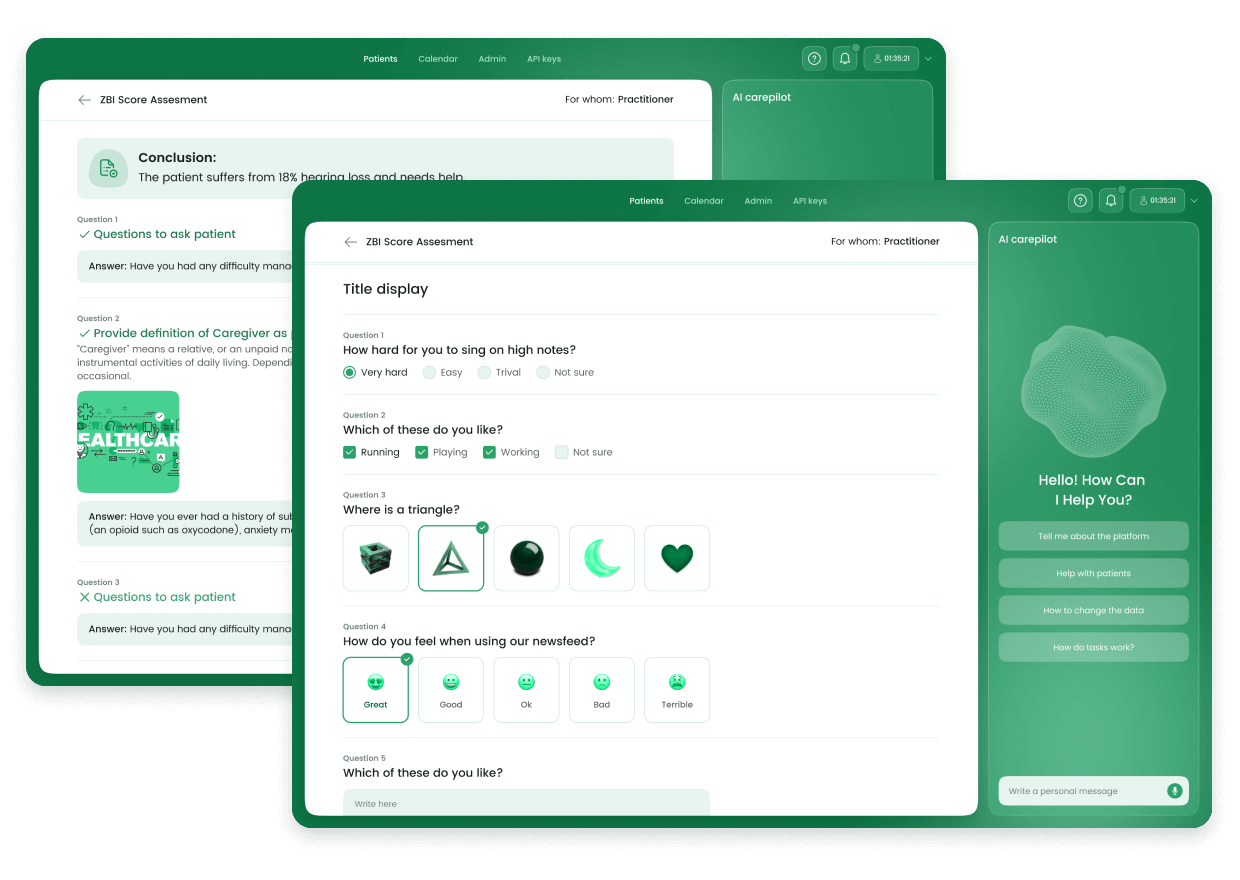
Streamlined Eligibility and Resource Integration
Complex eligibility checks and resource access delay support for dementia patients and caregivers.
Integrated with Approved Admissions for eligibility verification and public APIs like Find Help.org to aggregate community resources (e.g., transportation, meals) directly into the platform.
Impact:
- Reduces administrative time for eligibility checks by 40%.
- Connects caregivers to resources 30% faster.
- Enhances care coordination, a key GUIDE model goal.
Integrated with Approved Admissions for eligibility verification and public APIs like Find Help.org to aggregate community resources (e.g., transportation, meals) directly into the platform.
Impact:
- Reduces administrative time for eligibility checks by 40%.
- Connects caregivers to resources 30% faster.
- Enhances care coordination, a key GUIDE model goal.
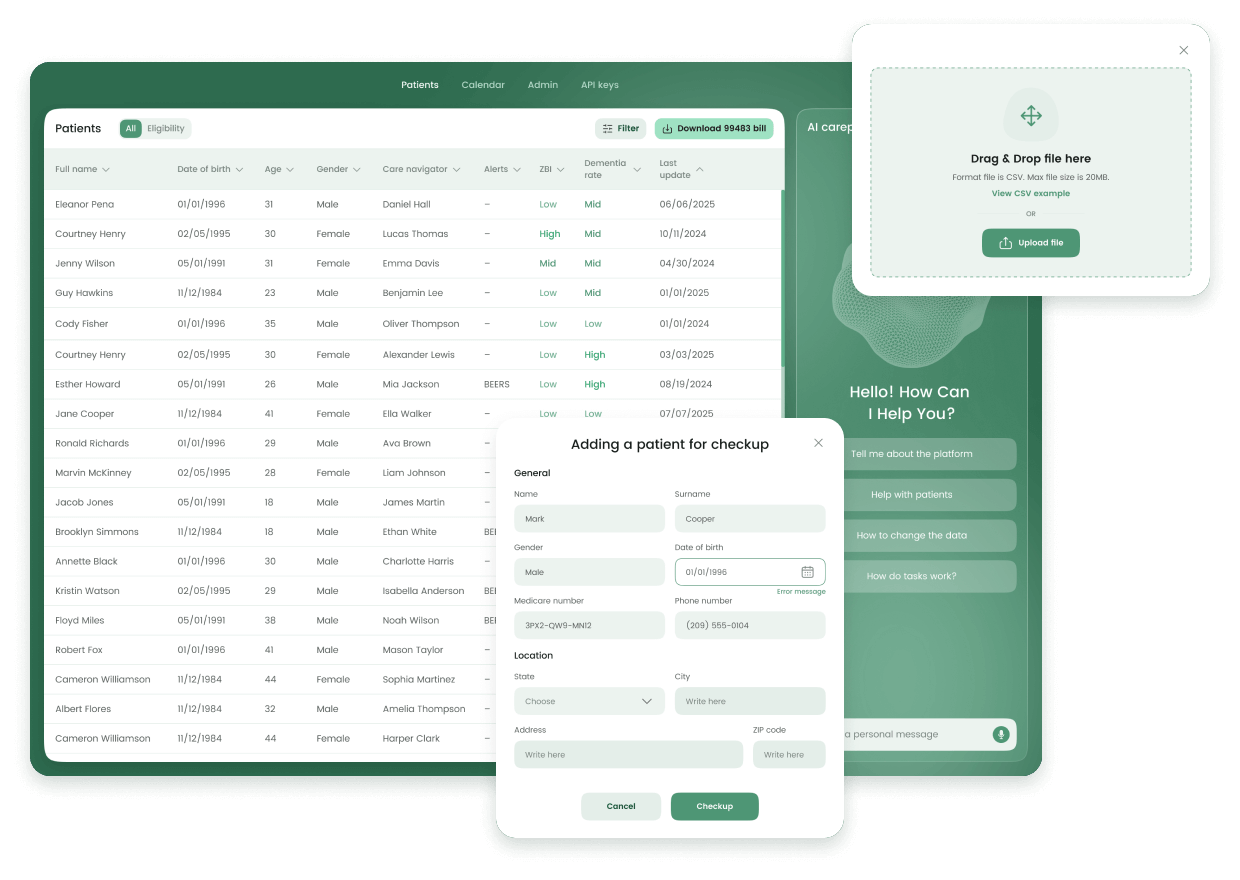
AI-Based 24/7 Support Chatbots
Providing 24/7 support with human staff is costly and impractical, leaving gaps in dementia care.
Implemented AI-based digital twins and chatbots with a custom knowledge base, offering round-the-clock guidance for caregivers and patients.
Impact:
- Cuts staffing costs by 50% for after-hours support.
- Provides immediate answers, reducing caregiver stress by 20-25%.
- Ensures continuous care access, addressing a universal healthcare challenge.
Implemented AI-based digital twins and chatbots with a custom knowledge base, offering round-the-clock guidance for caregivers and patients.
Impact:
- Cuts staffing costs by 50% for after-hours support.
- Provides immediate answers, reducing caregiver stress by 20-25%.
- Ensures continuous care access, addressing a universal healthcare challenge.
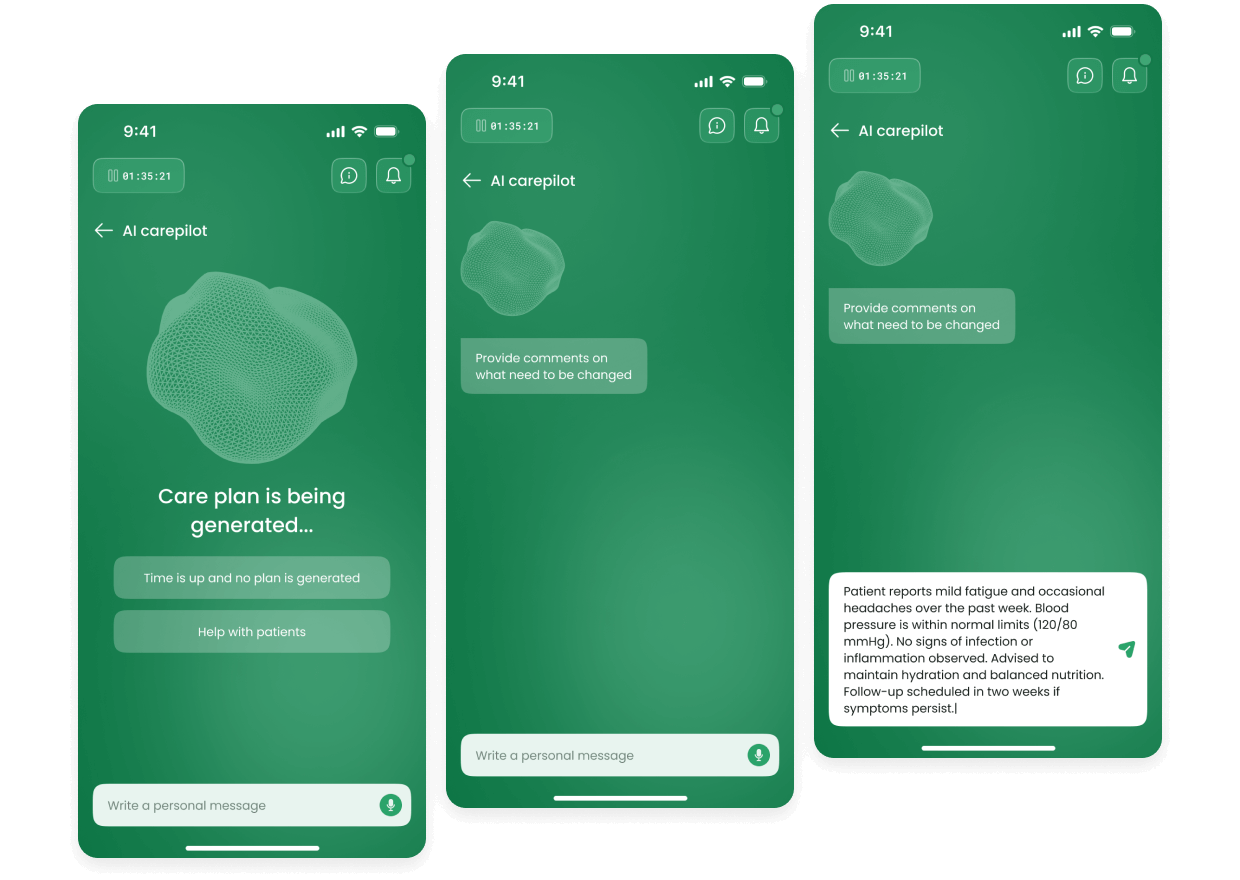
What are the outcomes?
The results

MVP in 5 months
Delivered a robust digital ecosystem with multiple AI integrations and time-saving tools for practitioners in under 6 months as estimated.

Market-Ready Infrastructure
Includes time tracking, CPT code documentation (e.g., 99483), and optional clearinghouse integrations.

84% less time
The client saw a reduction in time to generate treatment plans for psychiatry and dementia patients from 4h to 30 mins.
Book a live demo to see it in action
RELEVANT CASES
Check our more healthcare stories
AI-powered athletic footwear solution for professional athletes
6
Months to MVP release
Strava & Nike
EU competitor
Growing patient acquisition and revenue in virtual OB-GYN care
462
New patients acquired
$7M funding
Raised to scale nationwide
Cutting care delivery costs by 40% with AI-driven virtual-first healthcare
96% reduction
In cardiovascular disease amputations
Contact Us
Please provide your info and inquiry details below.
